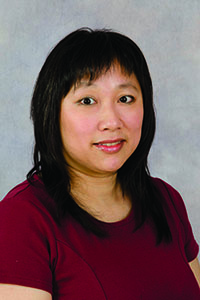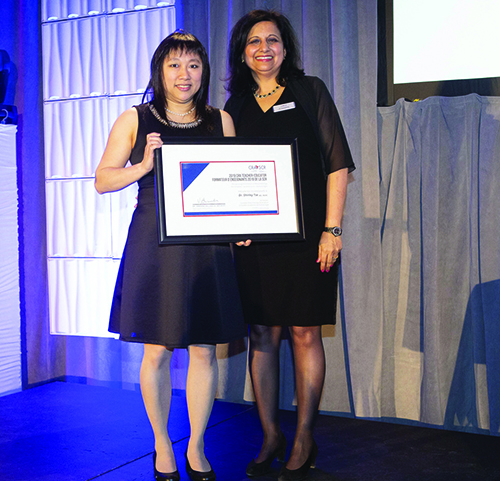Summer 2019 (Volume 29, Number 2)
Teacher-Educator:
Dr. Shirley Tse
Download PDF

From where do you think your
passion for medical education
stemmed?
It has always been great to be around
learners of all levels, and not only being
part of helping them acquire new
knowledge but also learning from
them as well. I am humbled that my
trainees keep me young and current
at the same time. This has translated
well in my role as program director
(PD) for the pediatric rheumatology
training program at SickKids, University
of Toronto. My PD role and
completing the Education Scholars
Program has laid the foundation
for being innovative and creative in
curriculum development, interactive
teaching, learner assessments, mentorship
and using technology to teach.
You have been the recipient of many prestigious teaching
awards, but what was your first thought when you
learned that you would receive this particular award?
Are you still surprised when you win?
I was completely unaware and very surprised when I learned
that I was the recipient of this award. In fact, I was in the
midst of a Competency by Design (CBD) workshop when
I kept getting messages from my rheumatology colleagues
(my amazing nominators) to check my email. It was an amazing
feeling and a true honour to be recognized, considered
and ultimately to receive this prestigious teaching award.
What do you believe are the qualities of a good educator?
Moreover, how do they apply to you?
There is always a teachable moment even in a busy clinical
environment. There is never a bad question, and learners
should always be made to feel safe to ask their questions or to
understand the rationale behind the answer. The key to making
learning stick is to simplify and promote understanding
rather than memorization. This is best demonstrated by
many of our talented faculty who teach immunology to our
trainees. It is one of the hardest topics to master but a vital
one for all rheumatology trainees and the best educators do
so in a passionate, clear and simple manner with associated
clinical applications (“immunology talk-show translators”).
At the same time, I have learned from
the best educators to acknowledge
your own limits, and that you may not
always have the answers, even as faculty
members. However, you can make
a plan together with your learners to
explore the question at hand, review
the literature, regroup and to discuss
again. It is equally important to be
flexible with your teaching, and to try
to align it with the learning style that
best suits your trainees. The ultimate
goal is to develop independent critical
thinkers, and for them to achieve their
personal best, but at the same time to
remind them it is important for them
to share their knowledge with others.
Can you recall a teacher in your
own past who inspired your direction into education?
I have been very fortunate to be surrounded by a plethora
of amazing and talented educators throughout my training
and currently in my career. Akin to an anthropologist on
a field excursion, I enjoy taking the time to watch and absorb
how successful scholarly educators teach and produce
scholarship and try to incorporate their valuable tips into
my practice.
Currently you are involved in the development of national
Entrustable Professional Activities and Milestones
through the Royal College in preparation for the
implementation of Competency by Design (CBD). Can
you explain what CBD is and how this impacts the medical
education environment?
It is aligned to the concepts of precision or personalized
medicine in the care of our patients. CBD moves away from
a time-based approach to a more personalized competence
in key knowledge, skills and abilities that residents acquire
as they progress along the developmental stages of their
rheumatology training program. At each stage, there will be
specific tasks or entrustable professional activities (EPAs)
that residents must be able to demonstrate independently.
Each EPA is broken down into multiple smaller tasks or
milestones that residents can work on and develop to make
this more manageable, and get coaching feedback, but also
progress according to their proficiency. At the same time, it will help teachers and assessors focus and observe on the
specific clinical activities and skills necessary for the resident
according to their stage of training, and to personalize
the support and expectations according to each resident’s
development, progress and proficiency. Ultimately, CBD
strives to ensure that graduating residents are competent
and have the skills and behaviours to meet the evolving patient
needs in addition to optimizing patient outcomes.
What projects are you currently excited to be working
on, and what projects would you like to undertake in
the future?
I have different clinical, educational and quality improvement
projects that I actively work on. In the educational
field, I am really interested in using technology to teach,
geared towards different learners including medical trainees,
healthcare providers and patients/families. As such, my
educational projects include web-based learning modules
to teach pediatric rheumatology, development and use of
educational videos and exploring use of virtual reality (VR)
in the clinical learning environment. I am also interested in
using gamification as a learning tool and enhancing learner
engagement.
Since becoming the Program Director for the Paediatric
Rheumatology Training Program at the University of Toronto
in 2007, how has the nature of training physicians
in this field changed?
Both the fields of rheumatology and medical education
have been very fluid and the training program has adapted
to respond to the ongoing advances and changes accordingly.
The curriculum and clinical environment has been
transformed to keep the trainees abreast of the changes,
including but not limited to increased understanding of
rheumatologic diseases (e.g., expanding autoinflammatory
disease spectrum), therapeutic targets (including biologic
agents and small molecules), innovative imaging applications
(e.g., vascular imaging techniques, whole body MRI,
US/POCUS) and incorporation of personalized/precision
medicine (utility of data, biomarkers, genes, motivational
interviewing, shared decision making). From the medical
education aspect, we have created a framework for developing
holistic physicians via the Royal College CanMeds competencies,
attention to quality improvement and patient
safety initiatives, and ultimately a move towards a new CBD
approach. Additionally, with our digital native learners,
there has been the implementation of various technology
into the clinical and teaching environment, including web-based
learning, educational videos, e-rheumatology resources,
joint injection simulators, e-health platforms and
medical apps. There are also more opportunities for trainees
to engage in scholarship in clinical research, basic/translational
research, education/teaching, quality improvement, musculoskeletal (MSK) ultrasound and leadership opportunities
during their core fellowship or additional years of
training.
What is a hidden talent of yours that not many people
know about?
I enjoy doing activities with my family. As such, we have
been doing family karate for almost 12 years now. We are
all third degree black belts and, yes, I can handle all the
weapons that “The Teenage Mutant Turtles” use. I even
placed first at a karate tournament…. in the women’s middle
age and early geriatric category…. but the trophy still
sits proudly in my office.
What was the first concert you ever went to?
I confess that I have a soft spot for “boy bands.” They have
been my staple background music for simply relaxing,
studying and writing. My very first boy-band concert was
to watch the Canadian Band known as Glass Tiger. It would
only take me 20 years later to finally enjoy the famous New
Kids on the Block and Backstreet Boys (NKOTBSB tour).
Fortunately at this later stage of my life, I could afford to sit
in the front row seats by the concert stage.

Dr. Shirley Tse receiving her award from Dr. Vandana Ahluwalia.
Shirley Tse, MD, FRCPC
Associate Professor,
Department of Paediatrics
University of Toronto
Staff Rheumatologist, Program Director,
The Hospital for Sick Children
Toronto, Ontario
|
